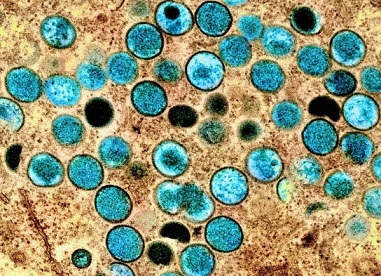Clinically used anti-HPV agent shows promise in preventing sexual transmission of Mpox
Nikhil Prasad Fact checked by:Thailand Medical News Team Aug 16, 2024 1 year, 5 months, 4 weeks, 1 day, 2 hours, 7 minutes ago
Mpox News: A New Hope in Monkeypox Prevention
The recent global outbreak of monkeypox (mpox) has created an urgent need for effective treatments and preventive measures. With sexual transmission being a primary route of the virus's spread, researchers have been in a race against time to develop antiviral agents that can help curb this alarming trend. A breakthrough study led by researchers from Fudan University-China, the Chinese Center for Disease Control and Prevention, Shanxi Jinbo Bio-Pharmaceutical Co., Ltd., the Chinese Academy of Sciences, and Shenzhen Bay Laboratory, sheds light on a potential game-changer in this fight. This
Mpox News report highlights the findings of their research, which investigates the use of a clinically proven anti-human papillomavirus (HPV) agent, 3-hydroxyphthalic anhydride-modified bovine β-lactoglobulin (3HP-β-LG), in preventing the sexual transmission of the monkeypox virus (MPXV).
 Clinically used anti-HPV agent shows promise in preventing
Clinically used anti-HPV agent shows promise in preventing
sexual transmission of Mpox
The Potential of 3HP-β-LG: A Clinically Proven Agent
The study focused on the effectiveness of 3HP-β-LG, a protein that has been previously used in clinical settings to combat HPV. Given its proven safety and efficacy, researchers were curious to see if this agent could also inhibit the MPXV. Using a plaque-reduction assay, the team screened 41 anhydride-modified proteins and found that 3HP-β-LG stood out as a powerful inhibitor of both vaccinia virus Tiantan strain (VACV-VTT) and MPXV infections. The study revealed that 3HP-β-LG works by targeting the early stages of virus entry into host cells, effectively blocking the virus from taking hold.
Understanding the Mechanism: How 3HP-β-LG Works
3HP-β-LG doesn't interact with the host cell but instead binds directly to the virus, specifically targeting the viral surface protein A29L. This binding blocks the virus from entering the host cells, a crucial step in preventing infection. The study also explored the interaction between the negatively charged amino acids in 3HP-β-LG and the positively charged amino acids in the viral protein, further detailing how this agent inhibits the virus. This insight into the mechanism of 3HP-β-LG provides a strong foundation for its potential use as a prophylactic agent.
Synergistic Effects: Combining 3HP-β-LG with Tecovirimat
One of the exciting findings of the study was the synergistic effect observed when 3HP-β-LG was combined with tecovirimat, a small-molecule antiviral drug approved for the treatment of smallpox and mpox. The combination of these two agents was found to be significantly more potent than when either was used alone. This synergy opens up new possibilities for more effective treatments and preventive measures against MPXV.
Topical Application: A Promising Avenue for Prevention
Given the proven efficacy of 3HP-β-LG, the stud
y also explored its potential as a topical agent to prevent the sexual transmission of MPXV. The researchers tested a 3HP-β-LG-containing lubricant, originally developed for preventing HPV transmission. The results were promising, showing that the lubricant effectively inhibited VACV-VTT infection in a dose-dependent manner. This finding suggests that a 3HP-β-LG-based product could be a valuable tool in preventing the spread of MPXV, particularly in high-risk populations.
Expanding the Horizon: Beyond Monkeypox
While the study focused on the application of 3HP-β-LG in preventing monkeypox, the findings have broader implications. The ability of 3HP-β-LG to inhibit other viruses, such as HIV, SARS-CoV-2, and influenza, highlights its potential as a versatile antiviral agent. This versatility, combined with its safety and efficacy, makes 3HP-β-LG a promising candidate for further development in the fight against various viral infections.
Conclusion: A Step Forward in the Fight Against Monkeypox
The study's findings represent a significant step forward in the fight against monkeypox. The identification of 3HP-β-LG as an effective inhibitor of MPXV, its potential for topical application, and its synergistic effect with tecovirimat provide new avenues for preventing the sexual transmission of the virus. As the world continues to grapple with the ongoing monkeypox outbreak, this research offers hope for more effective prevention strategies.
The study findings were published in the peer-reviewed journal MedComm.
https://onlinelibrary.wiley.com/doi/10.1002/mco2.677
For the latest
Mpox News, keep on logging to Thailand Medical News.
Read Also:
https://www.thailandmedical.news/news/latest-who-warns-of-several-breakthrough-monkeypox-cases-and-now-states-that-current-monkeypox-vaccines-are-not-100-percent-effective
https://www.thailandmedical.news/news/uk-study-shows-that-more-than-50-percent-of-individuals-with-monkeypox-infections-typically-develop-neurological-and-psychiatric-issues
